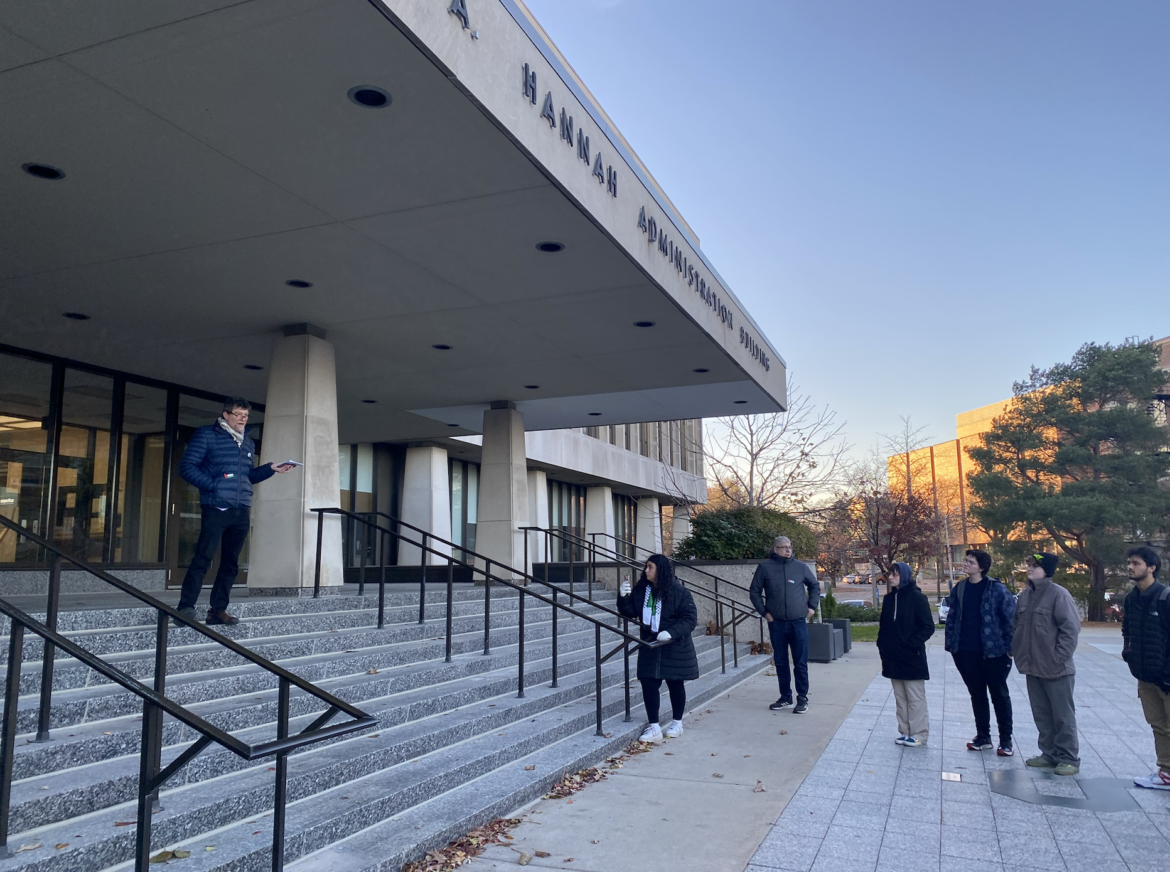Since the Israel-Palestine conflict resurged again on Oct. 7, students, professors and residents in Michigan have been pressured to choose one of two sides. The Palestine supporters in Greater Lansing include those originally from Palestine, who have family currently or formally there or for other reasons.
Since the attacks, MSU’s Students United for Palestinian Rights (SUPR) have held multiple protests, rallies and discussions to gain support for people who are pro-Palestine, or those who want to have a better understanding of the conflict.
Initially, they held a “Justice for Palestine” protest at the Michigan Capitol, where over 400 people gathered to support Palestine in its ongoing conflict with Israel. SUPR’s message was to “stop the genocide” and to “tell Biden and all elected officials to a ceasefire.”
Many attendees were wearing or waving the Palestine flag, throwing a fist in the air or holding signs. Some of the signs from the protest read the following: “Ceasefire now,” “End decades of oppression now” and “Free Palestine, free Gaza.”
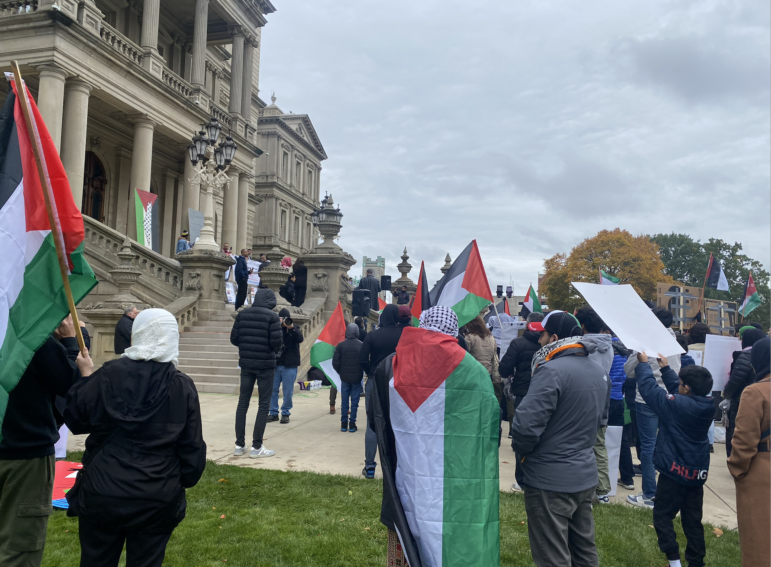
One person passionate about this issue is Sarah Hopkins, who said she wants the administration to have better decision-making regarding helping countries, especially in this conflict.
“I think what’s happening overseas in Gaza right now is wrong,” Hopkins said. “It’s genocide and I’m unhappy with our administration’s response to all of that. I just want to stand with people, with civilians and with innocent people who didn’t do anything wrong to deserve the atrocities that are happening.”
SUPR also held a “Hands Off Palestine” protest to ultimately bring more support for those in Palestine and this time, tell Michigan’s government that there should be no American support for Israeli war crimes. The protest massed over one hundred people, including students in SUPR, people of Palestinian descent and allies with Palestine. There were also “guards” who wore neon vests to differentiate themselves from the supporters; their main job was to mediate the protest and help if any anti-Palestine people showed up.
Various chants were called out throughout the protest, including: “From the river to the sea, Palestine will be free,” “Not another nickel, not another dime; no more money for Israel’s crime” and “Resistance is justified when people are occupied.”
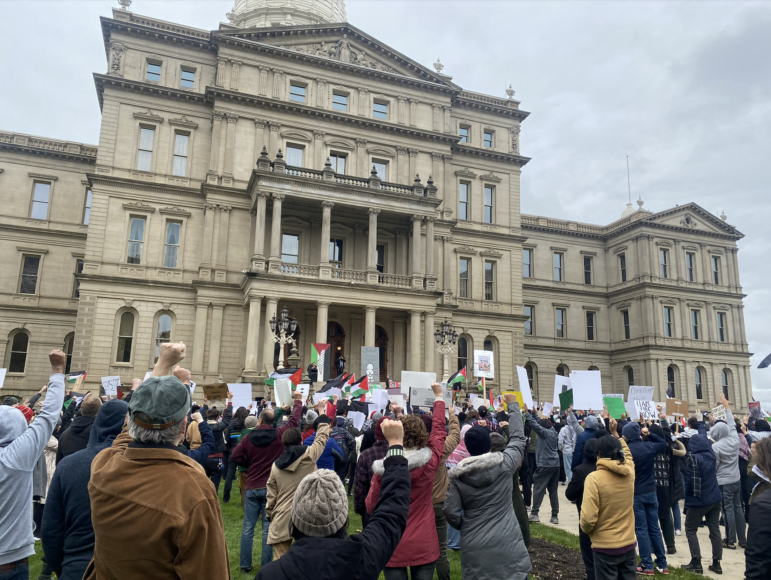
Linguistics senior and SUPR President Samir Levitt was the main orchestrator and mediator of this protest, starting up the chants, allowing for a moment of silence and giving a brief speech on behalf of SUPR’s perspectives and opinions on this subject, but more specifically what has happened this past week.
“This weekend, Palestinian resistance fighters have shown the world that their oppressors are not invincible, and the biggest step towards liberation that they have ever taken. The Resistance Movement and Gaza orchestrated and pulled off a mass prison break,” Levitt said. “Considerations in mind, SUPR unequivocally denounces all war crimes by Israel and otherwise, and targeting of civilians and civilian infrastructure. This is a just fight for liberation and should never harm innocence.”
Palestine supporter Sondos Al-Hachim attended the rally to support the people affected by this conflict. Al-Hachim said she was there because she wanted “peace for everyone.”
“We’re just supporting the people who’ve been bombed every single day and we’re praying that people will turn their water back on and at least they’ll have water and electricity back,” Al-Hachim said. “We want people to live in peace and have a childhood. I have a child and it’s really important to me that they live their childhood and not be scared to hear bombs all day and all night.”
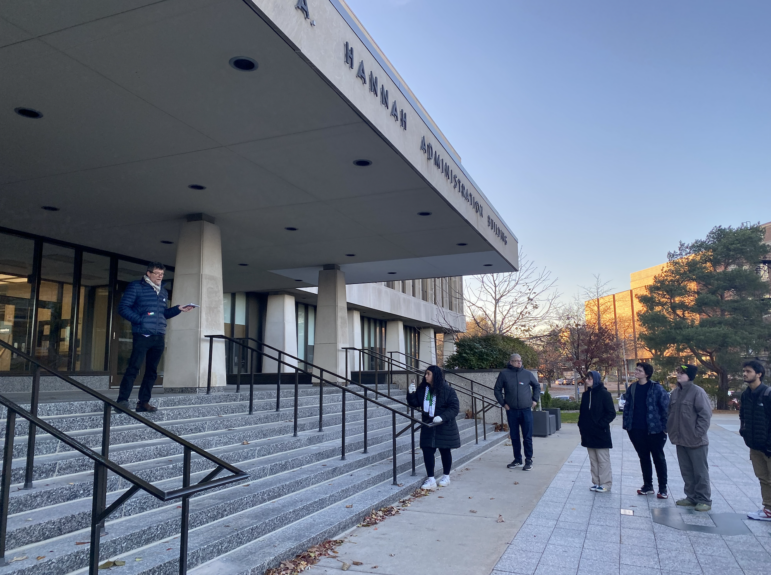
Levitt said he is upset by Israel’s government and how they keep killing the people of Palestine every day.
“This year has been the deadliest ever for Palestinians as Israel repeatedly assaulted and bombed civilian centers including refugee camps, schools, hospitals and religious institutions such as mosques, churches and graveyards,” Levitt said.
More recently, SUPR held a “Speakers Session On Palestine,” with MSU Arab Culture Society and Muslim Students’ Association, where professors and student leaders spoke about their personal experiences and opinions about the Israel-Palestine conflict. Many of the speakers emphasized the decisions that the United States government has issued for funding Israel are “very wrong.”
“I condemn Israel because it has no right to kill and expel Palestine’s indigenous people in mass,” Levitt said. “I stand with Palestine’s right to resist occupation. I stand with a free Palestine, a liberated Palestine.”
MSU James Madison College Professor Waseem El-Rayes attended and spoke at the session. He explained his story: he is Palestinian and a former refugee who has more than three-quarters of his family currently living in Gaza. El-Rayes said that his family’s roots in Gaza “extend more than 10 generations.”
El-Rayes lost eight extended family members due to bombings in Gaza and he reflected on his story and how eight people are small in comparison to the total number of people that have died in Gaza since this conflict resurged a month ago.
“This is just one story out of the 10,000 and counting from a population that Israel is crushing under the weight of its relentless firepower that our own government supports,” El-Rayes said. “We must do everything we can to stop this horrific massacre of Gazans. Contact your representatives and demand a ceasefire now.”
Brendan Culler, a student and supporter of Palestine, brought up the role the United States has with Israel and how the countries’ relationship has directly affected the lives lost in Gaza.
“The U.S. has given Israel over $270 billion, allowing defense contractors to line their pockets with blood money filling their wallets and bank accounts through genocide,” Culler said. “We must oppose injustice everywhere, which means we must oppose the United States’ support for Israel.”
He went on to say that even though “no one denies what Hamas did” initially on Oct. 7 is “tragic,” Israel’s continued response is an “affront to humanity.” Israel’s response includes, as Culler said, destroying Gaza’s “essential infrastructure,” controlling their “water, food, fuel, electricity and medical supplies” and bombing many areas of the land.
“If we don’t speak out now, when?” Culler said. “If we don’t do something, who will? The time is now to stand in solidarity with the people of Palestine.”
Associate professor in Sociology Stephen Gasteyer first visited Palestine in 1985 to study conflict. He would find his way back to Palestine every couple of years and lived there for “a number of occasions.” In recent years, however, he hasn’t gone but recently reached out to someone he used to go there with to see how he’s doing. He replied to Gasteyer saying that 43 of his family members died from the bombings in Palestine.
Gasteyer discussed the United States government and its ties to Israel including a personal experience he remembers the day the conflict started early last month.
“On Oct. 7, I watched President Biden come up before us as we were getting breaking news of the attacks that were taking place,” Gasteyer said. “At that time he referred to the attacks – and then later that night reemphasized the attacks – as brutal, bloodthirsty, worse than the outrages of ISIS and unprovoked; reminiscent of the ages of anti-semitism.”
He said that it’s hypocritical that Biden switched from saying the attacks were brutal to then aiding Israel, which is one of the reasons why so many people are fighting to get the United States administration to a ceasefire.
“Hundreds of thousands of people were out in the streets calling for humanity, calling for a ceasefire, calling for an end to this madness,” Gasteyer said. “All of this is not to celebrate the violence or say that violence was the answer [initially], but rather to decry and call for some humanity.”
Culler highlighted the importance to continue fighting, protesting and calling state representatives and urging them to a ceasefire.
“From the halls of our universities to the lobbies of our corporations, to the offices of our politicians to the ports shipping weapons destined for genocide, we will be there to tell them no to war and no to genocide,” Culler said. “We cannot have peace until Palestine is free.”
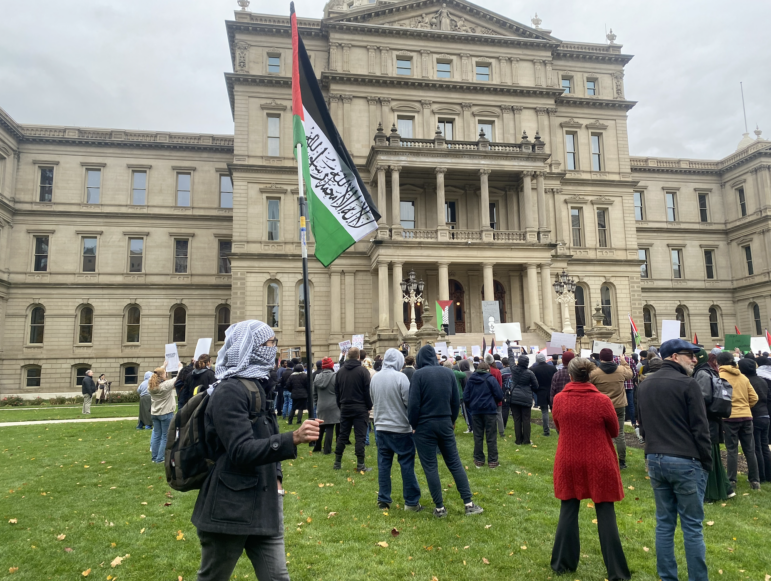
The United States and its government have been involved in the Israel-Palestine conflict for decades and have played a significant role in shaping the dynamics of the territories. The United States has historically been a strong ally of Israel and has provided diplomatic support, giving Israel aid more than “any other nation” since the 1940s. They have given the country more than $260 billion.
The billions of dollars they supply them transfer over in military aid and economic assistance to Israel annually. This aid is intended to enhance Israel’s security and military capabilities, which has directly affected the people of Palestine in the last five weeks.
On the other hand, Biden and his administration have provided humanitarian assistance to Palestinians, in the form of aid for development and relief programs. The government’s official statement said, “Civilians are not to blame and should not suffer for Hamas’s horrific terrorism. Civilian lives must be protected and assistance must urgently reach those in need. We will continue to work closely with partners in the region to stress the importance of upholding the law of war, supporting those who are trying to get to safety or provide assistance, and facilitating access to food, water, medical care, and shelter.”
Even though the statement explained the situation and the humanitarian aid they are giving to Palestine, the level of aid to Palestinians has been a subject of scrutiny and debate because it is so much less than the aid given to Israel.
Many news outlets have investigated the ongoing conflict between Israel and Palestine, especially since Oct. 7. Some just report on what their presidents and leaders are saying as well as Biden and the United States administration, and some journalists are going to the Palestinian and Israeli territories where some have even died while covering it.
One news outlet in particular has been reporting about this issue for years: National Geographic. They created a four-part video series explaining the history of the conflict and showing both sides of the issue.
For years on the West Bank on the border of Palestine villages and Israeli settlements, protests would take place where hundreds of Palestinians would join each other in expressing their disappointment in the Israel Defense Forces. The Israeli soldiers used an “arsenal of weapons to disperse the protests,” including gases and bullets that would launch over 80 meters away.
“[IDF] is a force that occupies their land and therefore threatens our existence,” a Palestinian protester said. “If we don’t [protest], then we are passive people.”
